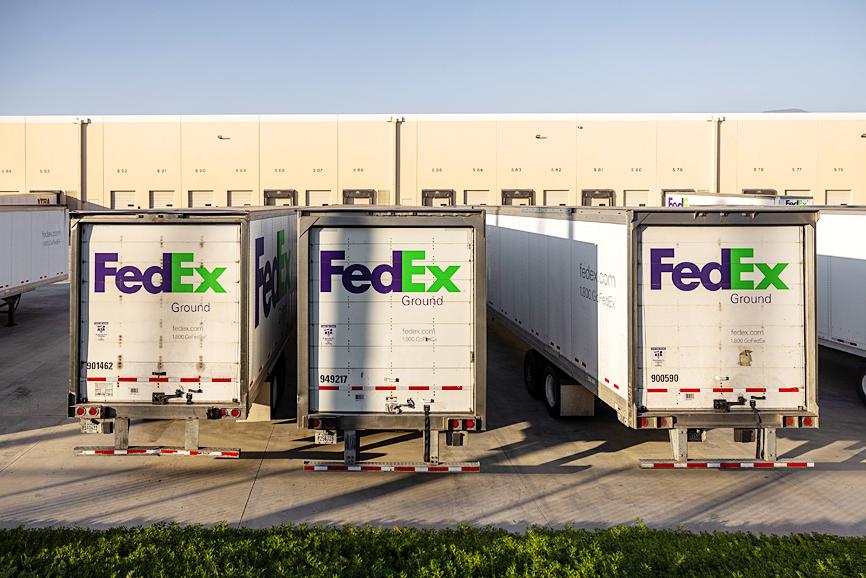FedEx Corp yesterday said that it is to shut its crew base in Hong Kong, the world’s busiest international cargo hub, and relocate its pilots as the territory considers stricter measures on flight crew amid the COVID-19 pandemic.
While the crew base is to close, FedEx is to continue to operate in Hong Kong, because it is a vital part of its Asia-Pacific and global network, the US company said in an e-mailed statement.
The company said that it is providing support for the relocation process of crew members, without providing further details.

Photo: Bloomberg
FedEx’s move comes after Hong Kong Chief Executive Carrie Lam (林鄭月娥) on Tuesday said that authorities would consider tougher rules after three Cathay Pacific Airways Ltd (國泰航空) cargo pilots were confirmed to have COVID-19 after returning from Frankfurt, Germany.
The territory is prioritizing a “COVID-19 zero” policy in a bid to reopen its border with mainland China.
The freight and parcel delivery giant is to continue to serve Hong Kong with pilots based in Oakland, California, the South China Morning Post reported, citing a memo by Robin Sebasco, Fedex’s system chief pilot.
The company at the start of the year relocated 180 pilots and their families from Hong Kong to California in response to aircrew quarantine measures, the newspaper said.
Cathay, the world’s third-biggest airfreight commercial airline, on Monday said that all crew who have flown in from Frankfurt this month are undergoing a 21-day quarantine at a government facility.
Crew members at Cathay are also required to get a third COVID-19 vaccine shot as soon as possible.
The carrier has also reached out to pilots of its Boeing Co 747 aircraft for more volunteers to participate in its so-called closed-loop plan — which requires them to fly non-stop for three weeks before entering a two-week quarantine upon their return — to ensure that services are not disrupted.

Nvidia Corp CEO Jensen Huang (黃仁勳) today announced that his company has selected "Beitou Shilin" in Taipei for its new Taiwan office, called Nvidia Constellation, putting an end to months of speculation. Industry sources have said that the tech giant has been eyeing the Beitou Shilin Science Park as the site of its new overseas headquarters, and speculated that the new headquarters would be built on two plots of land designated as "T17" and "T18," which span 3.89 hectares in the park. "I think it's time for us to reveal one of the largest products we've ever built," Huang said near the

China yesterday announced anti-dumping duties as high as 74.9 percent on imports of polyoxymethylene (POM) copolymers, a type of engineering plastic, from Taiwan, the US, the EU and Japan. The Chinese Ministry of Commerce’s findings conclude a probe launched in May last year, shortly after the US sharply increased tariffs on Chinese electric vehicles, computer chips and other imports. POM copolymers can partially replace metals such as copper and zinc, and have various applications, including in auto parts, electronics and medical equipment, the Chinese ministry has said. In January, it said initial investigations had determined that dumping was taking place, and implemented preliminary

Intel Corp yesterday reinforced its determination to strengthen its partnerships with Taiwan’s ecosystem partners including original-electronic-manufacturing (OEM) companies such as Hon Hai Precision Industry Co (鴻海精密) and chipmaker United Microelectronics Corp (UMC, 聯電). “Tonight marks a new beginning. We renew our new partnership with Taiwan ecosystem,” Intel new chief executive officer Tan Lip-bu (陳立武) said at a dinner with representatives from the company’s local partners, celebrating the 40th anniversary of the US chip giant’s presence in Taiwan. Tan took the reins at Intel six weeks ago aiming to reform the chipmaker and revive its past glory. This is the first time Tan

CUSTOMERS’ BURDEN: TSMC already has operations in the US and is a foundry, so any tariff increase would mostly affect US customers, not the company, the minister said Taiwanese manufacturers are “not afraid” of US tariffs, but are concerned about being affected more heavily than regional economic competitors Japan and South Korea, Minister of Economic Affairs J.W. Kuo (郭智輝) said. “Taiwan has many advantages that other countries do not have, the most notable of which is its semiconductor ecosystem,” Kuo said. The US “must rely on Taiwan” to boost its microchip manufacturing capacities, Kuo said in an interview ahead of his one-year anniversary in office tomorrow. Taiwan has submitted a position paper under Section 232 of the US Trade Expansion Act to explain the “complementary relationship” between Taiwan and the US